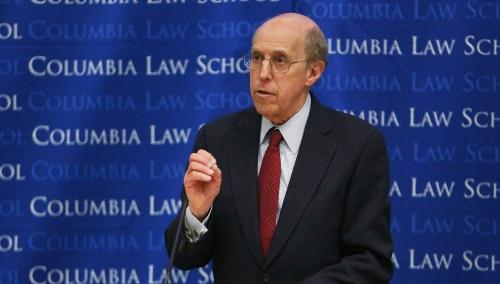Michael Cardozo '66 Recounts Career in Government Service, Obligations of Chief Legal Officers
Cardozo, Longtime Head of the NYC Law Department, Returned to the Law School as Social Justice Initiatives' Visitor from Government Practice and to Deliver the Maurice Rosenberg Memorial Lecture.
New York, April 22, 2014—New York City’s “apple green” all-borough taxis. Calorie posting and smoking bans in restaurants. A crackdown on illegal guns.
These are just a few examples Columbia Law School alumnus Michael A. Cardozo ’66 gave students at an April 8 lunchtime presentation while discussing policy initiatives he helped put in place—in part through litigation—during his tenure as New York City’s chief counsel under Mayor Michael Bloomberg.
Cardozo led the 700-attorney New York City Law Department as corporation counsel for 12 years, longer than any of his predecessors. The 2007 recipient of the Law School’s Lawrence A. Wien Prize for Social Responsibility and former chair of its Board of Visitors returned to campus to discuss his government service and answer questions from students as Social Justice Initiatives’ Visitor from Government Practice. Later in the day, he also delivered the Maurice Rosenberg Memorial Lecture, discussing the conflicting ethical, legal, and public policy obligations facing government attorneys.
| Michael Cardozo '66 spoke to students, faculty, and guests about the ethical, legal, and policy obligations of serving as a government attorney. |
In his Rosenberg lecture, “The Conflicting Ethical, Legal and Public Policy Obligations of the Government’s Chief Legal Officer,” Cardozo highlighted some of the difficult decisions he was compelled to make as corporation counsel. These included appealing a New York State Supreme Court ruling that the state’s prohibition on gay marriage was unconstitutional despite the fact that many New York City voters, including Mayor Bloomberg, favored extending the institution to gay couples.
“While government attorneys don’t leave their legal or moral consciences behind when they take their oaths of office, they have a special duty to ensure that, whenever a challenge is brought against a duly enacted and not clearly unconstitutional law, the law will be defended so that a court can review the issue,” he said. “To do otherwise means the government lawyer effectively has the power to abrogate duly enacted legislation. In my view that is wrong.”
In his lecture, Cardozo also discussed his view that while a government lawyer must privately give policy and legal advice to top officials, in defending civil law suits the lawyer’s obligation is to defend the municipality within the bounds of the law. He took issue with those who have suggested the government lawyers have an independent obligation, beyond defending the government, “to do justice.”
Columbia Law School Professor Richard Briffault introduced Cardozo at the lunchtime talk, “Litigation as a Means of Effecting Policy Change: The Excitement and Rewards of Serving as a Government Lawyer,” calling the alumnus “the ideal Columbia Law School graduate.”
“He excelled at everything you can think of a lawyer doing,” Briffault said, noting Cardozo’s public service, his 35 years in private practice at Proskauer Rose (the firm he rejoined after leaving the city at the end of Mayor Bloomberg’s tenure), and his involvement with law reform efforts at the New York City Bar Association and while chair of The Fund for Modern Courts.
Cardozo, whose grandfather’s first cousin was U.S. Supreme Court Justice and 1915 Columbia Law School alumnus Benjamin Cardozo, spoke highly of his time in private practice but said, “there’s something very, very special about being a government lawyer.”
“There is nothing that can match the intellectual excitement,” he said. Under Cardozo, New York City Law Department attorneys were at the forefront of defending constitutional challenges to security enhancements in the aftermath of 9/11 and fallout from public protests during the 2004 Republican National Convention and the Occupy Wall Street movement.
Cardozo added that not all government attorneys are litigators. The Law Department’s real estate and commercial divisions also have been involved in matters that have left their mark on the city. He said, for example, that city lawyers had been behind the transformation of a former freight rail line into the High Line, one of the city’s most popular tourist attractions, and the ongoing work on Brooklyn Bridge Park.
Ellen P. Chapnick, dean for Social Justice Initiatives, said students don’t have to wait until they graduate to work for Cardozo’s former office. Thanks to externship and internship programs she and Cardozo created, Columbia Law School students can work in the New York City Law Department during the academic year or over the summer.
Cardozo, who also met one-on-one with students throughout the day for more personal career discussions, urged the future attorneys in attendance to consider careers in government service at some point in the future.
“There’s nothing like it,” he said.
